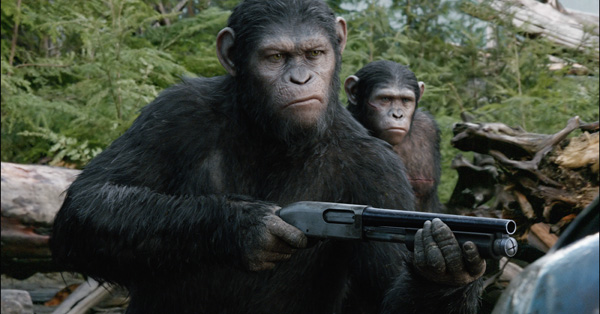Planet of the Apes is a curious franchise - the original series driven into the ground, the original film remade, and eventually rebooted, with 2011’s Rise of the Planet of the Apes drawing on the later films’ mythology, particularly from Conquest.
The series has succeeded and persevered by taking its ludicrous premise seriously, from the racial themes of the original through to modern concerns about vivisection and ageing reflected in the previous instalment.
While the allegory this time isn’t entirely clear yet, the story centres around the tension between Dreyfus (Gary Oldman), who blames the apes for the Simian flu that’s devastated humanity and favours war, and Malcolm (Jason Clarke), a family man attempting a more conciliatory approach with Caesar, the leader of the apes.

Andy Serkis introduced the new footage via video, appropriate given that he is the de facto star of the franchise even while his face is never on screen (his is the only returning character from the previous film, and he was the first actor to be signed). The clips shown were extended moments from the trailer, although many of the effects were unfinished. First two apes returning from fishing encounter Carver (Kirk Acevedo) in the forest. He shoots one, bringing his group of humans and the apes’ group of apes into a standoff. Caesar tells them to go and they do, Malcolm’s son dropping a satchel. Later some apes look at a book of drawings that was in the satchel, drawings of weapons.
They discuss whether to attack the humans. There’s another scene where Malcolm walks out of the human base in a ruined city against Dreyfus’s wishes to meet Caesar, on horseback, surrounded by apes. Finally there were two scenes of ape-human bonding, first with Malcolm’s teenaged son reading Charles Burns’ graphic novel Black Hole to an orangutan, and then Malcolm’s wife Ellie (Keri Russell) playing with a baby ape after the apes “saved our lives”.
While the human drama suggests a war on terror metaphor, with apes as the convenient scapegoat used to unite humanity’s factions, more compelling are the glimpses of the ruined San Francisco. Rather than just post-apocalyptic, the landscape is post-human; Mother Nature has shrugged humanity off and reclaimed the planet, and we are far from the dominant species any more.
This film could end with humanity’s enslavement - it would make sense for the continuation of the franchise - but we might have already lost. The fear is that if you take away our strength in numbers and our technology, as has happened between the last film and this one, there’s nothing special about us left. In this way the marketing’s focus on performance capture, over and above the blander human characters, makes perfect sense.
Caesar will most likely be the emotional core of the film and we will, once again, find ourselves rooting against humanity.
If Dawn of the Planet of the Apes manages to embrace and explore these themes in an interesting way, it could not only be a great blockbuster but also great science fiction.